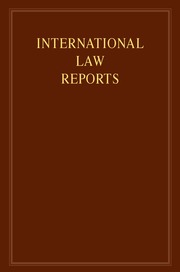No CrossRef data available.
Article contents
Querouil v. Breton
Published online by Cambridge University Press: 01 January 2021
Abstract
International law in general — Sources — Customary international law — Treaty as evidence of current practice in international law — Whether binding on non-ratifying State — Statement of executive as evidence of custom — The law of France
States as international persons — In general — Sovereignty and independence — Conduct of foreign relations — Conclusiveness of statements of the Executive — International convention signed but not yet ratified by State — Executive statement that convention embodies principles of customary international law — Whether courts should take notice of this statement — Vienna Convention on Diplomatic Relations, 1961 — The law of France
Treaties — Conclusion and operation of — Effect of treaties on third parties — Vienna Convention on Diplomatic Relations, 1961 — Whether codification of existing international law — Whether binding on non-ratifying States as evidence of current practice — The law of France
Diplomatic and consular intercourse and privileges — Permanent diplomatic envoys — Privileges and immunities of — Diplomatic envoys and their staff — Envoy a national of receiving State — Action for eviction from private residence — Whether envoy entitled to immunity from jurisdiction — Immunity limited to acts performed in exercise of diplomatic functions — Vienna Convention on Diplomatic Relations, 1961, Article 38(1) — Whether codification of existing international law — Whether Convention binding on non-ratifying States as evidence of current practice in international law — Statement of Executive as evidence of custom — The law of France
Keywords
- Type
- Case Report
- Information
- Copyright
- © Cambridge University Press 1986




